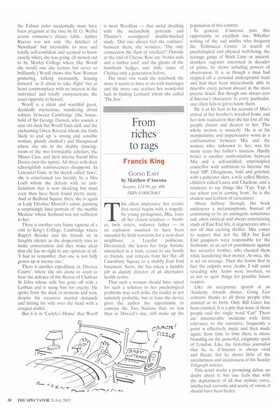From riches to rags
Francis King
GOING EAST by Matthew d'Ancona Sceptre, £14.99, pp. 406
ISBN 0340828463
This often impressive but erratic first novel begins with a tragedy. Its young protagonist, Mia, loses all her closest relatives — brother, twin sisters, widower father — in an explosion assumed to have been intended by Irish terrorists for a next-door
neighbour, a Loyalist politician. Devastated, she leaves her large fortune untouched in a trust, ceases to see family or friends, and retreats from her flat off Canonbuty Square to a shabby East End basement. Soon, she has taken a humble job as deputy director of an alternative health centre.
That such a woman should have opted for such a solution to her psychological problems may well strike the reader as not remotely probable; but at least the device gives the author the opportunity to contrast the Two Nations that, no less than in Disraeli's day, still make up the population of this country.
In general, d'Ancona puts this opportunity to excellent use. Whether writing of the sad misfits who frequent the `Echinacea Centre' in search of psychological and physical well-being, the teenage gangs of Brick Lane or ancient, drunken vagrants cocooned in decades of grime, he shows unfailing powers of observation. It is as though a man had stepped off a crowded underground train and had then been miraculously able to describe every person aboard in the most precise detail. But though one always sees d'Ancona's characters in every particular, one often fails to get to know them.
He is at his best in his account of Mia's arrival at her brother's wrecked home and her slow realisation that she has lost all the people closest and dearest to her. This whole section is masterly. He is at his manipulative and unpersuasive worst in a confrontation between Mia and the woman who, unknown to her, was for many years her father's mistress. Hardly better is another confrontation, between Mia and a self-satisfied, unprincipled councillor with ambitions to become the local MP. Oleaginous, bald and grizzled, with a polyester shirt, a wife called Shirley, children called Laura and Charlene, and a tendency to say things like `Yup. Yup. I see where you're coming from', he is the crudest and feeblest of caricatures.
About halfway through, the book undergoes a metamorphosis. Instead of continuing to be an astringent, sometimes sad, often satirical and always entertaining study of East End life, it degenerates into a not all that exciting thriller. Mia comes to suspect that not the IRA but East End gangsters were responsible for the firebomb, as an act of punishment against her secretive brother, who cheated them while laundering their money. At once, she is set on revenge. Then she learns that in fact the culprits were Arabs. I will resist revealing why Arabs were involved, so as not to spoil things for possible future readers.
Like an acceptance speech at an Academy Awards dinner, Going East contains thanks to all those people who assisted at its birth. Only Bill Gates has been omitted. It is a pity that none of those people said the single word 'Cut!' There are innumerable incidents with little relevance to the narrative; frequently a point is effectively made and then made again; from time to time there is otiose brooding on the powerful, enigmatic spirit of London. Like the first-class journalist that he is, d'Ancona is always vivid and fluent; but he shows little of the succinctness and incisiveness of his Sunday Telegraph articles.
This novel marks a promising debut, no doubt about it; but one feels that with the deployment of all that stylistic verve, intellectual curiosity and acuity of vision, it should have been better.


























































 Previous page
Previous page